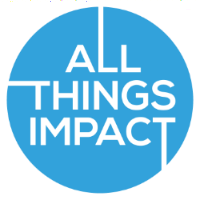Hi friends,
Welcome to another issue of All Things Impact, a weekly newsletter with insights from across the spectrum of impact: effective philanthropy, impact investing (in the private markets), responsible investing (in the public markets) and awildcard topic.
Here are this week’s links worth your time:
1. Effective Philanthropy: Are LLC’s the new Foundations? 45 billion reasons why this may be so
(This is a big deal, so more than just one link.) On #GivingTuesday Facebook founder Mark Zuckerberg and his wife Dr. Priscilla Chan announced their creation of a Limited Liability Company (LLC) called the Chan Zuckerberg Initiative with the mission of “advancing human potential and promoting equality for all children in the next generation.” They are intending to place 99% of their Facebook shares into this LLC during their lifetimes. This has produced a lot of stories and opinions in the New York Times, Vox, Bloomberg, The Guardian, The New Yorker, Wall Street Journal, ImpactAlpha, and the Chronicle of Philanthropy, among others. ThisBloomberg article provides 4 potential reasons why the couple decided on the LLC structure instead of a traditional foundation:
- No limits on lobbying (allowing greater flexibility to engage in policy advocacy work as well as make political donations)
- Ability to turn a profit (allowing greater range in deploying capital to both for-profit companies and nonprofit organizations)
- Easier to do joint ventures (so they can collaborate more easily with for-profit companies than foundations typically can; plus, they can more easily take in money from other “donors”)
- Avoid the 5% payout requirement (allowing them greater optionality in when they chose to deploy their capital).
Does this set a new precedent for other millennial tech billionaires? Taking a twist on the classic line from the Social Network movie: “A Foundation isn’t cool. You know what’s cool? An LLC.”
2. Impact Investing: “The Planet-Saving, Capitalism-Subverting, Surprisingly Lucrative Investment Secrets of Al Gore”
This Atlantic piece by the always-terrific James Fallows on Al Gore’s $12 billion fund Generation Investment Management is worth your time:
“The most sweeping way to describe this undertaking is as a demonstration of a new version of capitalism, one that will shift the incentives of financial and business operations to reduce the environmental, social, political, and long-term economic damage being caused by unsustainable commercial excesses. What this means in practical terms is that Gore and his Generation colleagues have done the theoretically impossible: Over the past decade, they have made more money, in the Darwinian competition of international finance, by applying an environmentally conscious model of “sustainable” investing than have most fund managers who were guided by a straight-ahead pursuit of profit at any environmental or social price.”
“The idea is that if some tenets of “long term” and “value based” investing are extended to include the environmental and social ramifications of corporate activity, the result can be better financial performance, rather than returns that are “nearly as good” or “worth it when you think of the social benefits.””
3. Responsible Investing: The Wall Street Journal offers readers a guide to sustainable investing
The fact that the WSJ is producing this report as a guide to readers – both individual and institutional investors – is informative (perhaps even more so than the piece itself).
“Investments marketed as sustainable—meaning they focus on companies that incorporate environmental and social corporate-governance practices into long-term corporate strategies—are experiencing explosive growth…even people within the sustainable business can’t agree on what is sustainable and what isn’t…The main issue is the lack of uniform information for both individual and institutional investors, meaning interpretation of the word “sustainable” varies depending on who is using it. That can cloud investor decisions when it comes time to dedicate money to a specific fund.”
4. Wildcard: Left & Right come together to focus on criminal justice reform
President Obama and the Koch brothers don’t agree on much. But in this fascinating conversation (part of the excellent “The Axe Files” podcast), former Obama strategist David Axelrod speaks with Koch Industries general counsel Mark Holden about the Koch brother’s push for criminal justice reform, and the broader challenges of the US political system in general. Worth a listen.
That's it for this week! Please send me any compelling links you discover in your own journeys across the web (even things like this gif of an adorable corgi surprised when he discovers that a “rock” is actually a turtle).
Until next week!
Brian
